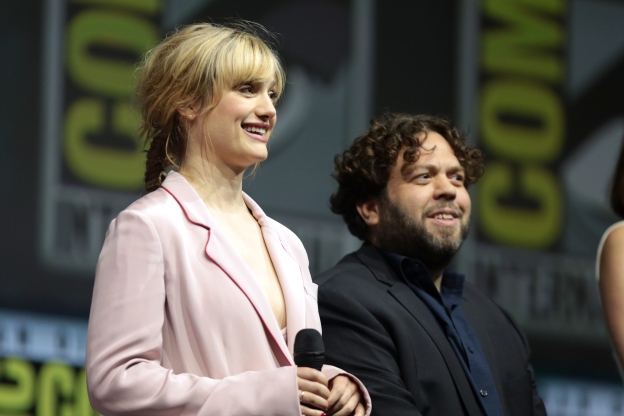
I wanted to start this review with the confusing case of Queenie Goldstein (Alison Sudol) but happened to have forgotten her last name. So I googled her. I wasn’t disappointed. The first hit I got was an obscure blog entry – though not as obscure as mine I’m sure – entitled “Queenie Goldstein makes no sense in ‘Fantastic Beasts – The Crimes of Grindelwald’”. Wow. I definitely didn’t get the memo then.
In a world where yellow-haired populist leader Gellert Grindelwald (Johnny Depp wearing his customary make-up), unlike his two-dimensional successor Lord Voldemort, earns his followers’ support through his arguments instead of coercing their terrified allegiance, Queenie is your average Trump supporter. She’s not necessarily evil or ignorant but she desperately needs someone to challenge the status quo. Her doomed love affair with a Muggle encapsulates all the issues plaguing the post-WWI wizarding world and her joining the dark side of magic serves as a telling example of Grindelwald’s popular appeal. J.K. Rowling is really making it hard for us not to draw obvious parallels between her fiction and reality in neoliberal western democracies where the likes of Trump, Farage and Le Pen are mistaken for the voice of reason by the disenfranchised masses.
This distinction between Voldemort’s undisguised and ruthless dictatorship and his predecessor’s unapologetic yet seemingly noble fight for “the greater good” is crucial. Some might say Harry Potter’s best-selling author has merely come crawling out of the woodwork to add a few hundred million pounds to her estate. While that may very well be a part of the equation, those of you who follow her on Twitter are probably familiar with Rowling’s political views and her fondness for analogies. Using Grindelwald’s more subtle tactics to echo our society’s tendency to create its own archenemies through its most serious shortcomings isn’t something I would put past her. Theseus Scamander (Callum Turner) is fully aware of all the implications when he tells his fellow Aurors: “It isn’t illegal to listen to him! Use minimum of force on the crowd. We mustn’t be what he says we are!” However, when one of his followers is killed in front of hundreds of witnesses at his rally, Grindelwald is quick to reap the benefits of yet another unforced error made by the establishment: “Go forth from this place and spread the word: it is not we who are violent.” This is coming straight from the self-victimization chapter of a demagogue’s playbook.
Furthermore (is this semi-formal review becoming too formal?), the fact that a Legilimens should act as a symbol of what leads to Grindelwald’s rise to power is no coincidence either. Queenie can read minds for crying out loud! And yet she still makes that fateful decision. She can probably see through Grindelwald’s euphemisms (“I say the Muggles are not lesser, but other. Not worthless, but of other value. Not disposable, but of a different disposition”) or could if she wanted to. Not to mention that her fiancé chooses to stay behind when she crosses the threshold leading to Grindelwald’s side. Voting against our own interests, that age-old argument, isn’t that something that’s been going on since the dawn of time?
So Queenie kind of makes sense as a character from this standpoint, right? Which is not necessarily the case of everyone as far as the returning Fantastic Beasts characters are concerned. I’ve already mentioned Jacob Kowalski (Dan Fogler) in passing as the No-Maj Queenie is besotted with, which gives him his significance in the grand scheme of things. Apart from that, his comic relief function is a breath of fresh air in this mostly grim movie. For all their touching awkwardness and dramatic lack of eye contact, Newt Scamander (Eddie Redmayne) and Tina Goldstein (Katherine Waterston) are not so lucky. They’ve gone from central characters to mere bystanders in the span of one franchise installment. They’ve become a subplot that is mostly used as a pretext to tell Dumbledore (Jude Law) and Grindelwald’s intertwined stories.
This new focus acts as a safeguard against the movie’s numerous inconsistencies and seemingly blatant contradictions. The viewers can’t help but focus on the main plot and the vital questions it raises instead of dwelling on characters who have miraculously come back from the dead, haven’t been obliviated after all or were included in the plot for undisclosed reasons. Even the way this movie keeps asking American actors (Depp, Kravitz) to use their linguistic wand to turn themselves into (very convincing to my taste) British witches and wizards as if there was a shortage of great actors in the UK and not enough American parts in the film gets swept under the rug. If this is not magic, I don’t know what is.
And if none of this has convinced you to get an upgrade on your Glasgow Cineworld ticket to treat yourself to a bankruptcy-inducing Swiss cinema experience like I just did (check my previous post for the rest of this elaborate joke), I have two more words for you: Leta Lestrange (Zoë Kravitz). Not sure if her eyes can compete with those of a salamander but she’ll take your breath away even if the rest of the movie fails to do so. Yup, I’ve read the reviews that claim the Harry Potter franchise has taken an anti-feminist turn by weakening and/or killing off its female protagonists and making one of them look like a marriage-obsessed lunatic. And yes, I stand by everything I said here, including the part on dazzling Leta Lestrange.

Picture 1: mine.
Picture 2: Wikimedia Commons. Gage Skidmore. Alison Sudol and Dan Fogler speaking at the 2018 San Diego Comic Con International, for « Fantastic Beasts: The Crimes of Grindelwald », at the San Diego Convention Center in San Diego, California.